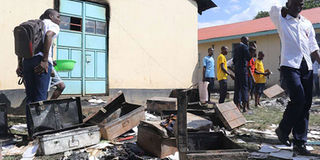Manage secondary schools better to forestall second-term madness

The aftermath of a dorm fire at Ambira High School in Siaya County on July 6, 2018. Solutions to student unrest should be found quickly. PHOTO | FILE | NATION MEDIA GROUP
What you need to know:
- The curtailing of social activities and entertainment, and the impeding national examination, could all be contributory factors.
- Therefore, there really is no option but to manage our institutions better. A country of dunces would be a very unattractive place to live in.
Although many parents are afraid at the beginning of every school year because they are sure to deplete all their savings paying school fees, buying uniforms, shoes, books and many other paraphernalia for their children joining secondary school, it is the beginning of the second term they dread most, for it is usually costly in more ways than one.
It is also the time of year that teachers and education officials fear most. Now that dark period is upon us, and judging from the past, we are completely helpless.
By the second term of a school year, many parents have already lost a great deal of control over their children who are waiting to sit their Form Four examinations and who have started regarding themselves as adults who shouldn’t be disciplined by anyone.
But of course these chaps are still in their formative stage, still extremely vulnerable to peer pressure, and very susceptible to outside influences.
In other words, at 17 or thereabouts, they are still children in transition to adulthood and as a result, rebellion to any form of authority becomes pronounced.
VIOLENCE
Many studies have been conducted to explain the reasons for this upsurge in mindless violence, and they can all be summed up in a paragraph because the causes listed are always the same.
Among them is poor management by principals, rules that are too strictly enforced, fear of examinations, lack of guidance and counselling, poor diet, interference in school affairs by busybody outsiders including politicians, poor attitude by teachers who abscond from duty to go mind their side hustles, drug and alcohol abuse in and outside school, and the stringent measures taken by the ministry to curb examination cheating.
A history of the deadly outcome of this unrest in the last 10 years is horrifying, indicating that the solutions tried out by education authorities have not really worked.
In July 1991, male students at St Kizito Mixed Secondary School ran amok and descended upon their female colleagues, set their dormitory on fire, raped 71 of them and killed 19.
DORM FIRES
Six years later, 26 female students of Bombolulu Secondary School in Mazeras, Kwale County, were killed when their dormitory was burnt to ashes.
In May 2001, 63 students of Kyanguli Mixed Secondary School in Machakos perished in an arson attack.
In between, there have been minor horrors in terms of scale. In 1999, Nyeri High School students locked up four prefects in a cubicle, doused it in petrol and set it ablaze.
And at Moi Girls High School, Nairobi, an ostensibly deranged student set her dormitory ablaze in 2017, killing nine girls.
Last year was relatively calm, but that is only because no deaths were reported. According to the ministry, there were 107 cases of unrest in schools, 63 of which involved real or attempted arson.
This means that a cure has not been found yet. Nor will it be found soon, because there are issues that even school or ministry authorities have no control over.
CHANGE
For instance, neither teachers nor parents can limit the use of social media, although this platform has taken over the lives of many adolescents.
I have always maintained that the internet has a very inimical influence on the development of students’ thinking capacity, for all the answers are just a click away, which is perhaps worse than the old-fashioned cramming for exams.
Another cause that has been cited of late is the decision by the Teachers Service Commission to implement the delocalisation policy during which headteachers who have overstayed at one workstation are transferred.
In some cases, the new principals are rejected by local people, no doubt incited by local tenderpreneurs.
Some of them are said to vent their frustrations on students by imposing punitive disciplinary measures, or by insisting on study schedules that would have made ancient Spartans cower.
There is no reason for students to be forced to wake up at 4am and go to bed at 10pm. Such conditions are enough to make students burn with anger.
FREEDOM
In any case, blaming delocalisation for rising indiscipline looks like clutching at straws.
The policy was imposed only last year and it cannot explain why many students went bonkers in 2016 and burnt more than 100 schools.
Perhaps more pertinent are the rules imposed by the Education ministry.
The curtailing of social activities and entertainment, and the impeding national examination, could all be contributory factors.
Again, some students just want to go home when they feel fatigued. This may appear pedestrian, but young people deserve a break now and then if only so they can go annoy someone else — their parents.
For the sake of everyone’s peace of mind of — teachers, education authorities and parents — one can only hope that this second term will be a lot less disruptive than previous ones.
Education is about shaping and broadening the minds of young people and it is still the Great Equaliser.
Therefore, there really is no option but to manage our institutions better. A country of dunces would be a very unattractive place to live in.
Mr Ngwiri is a consultant editor; [email protected]





